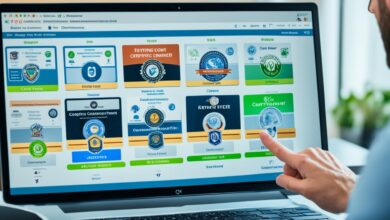Boost Your Career with Communication Skills

Do you want to excel in your career and achieve your professional goals? Are you looking for a way to stand out among your peers? The key to career success lies in one crucial ability that often goes overlooked: communication skills.
Effective communication is not just about speaking clearly or writing concisely, it’s about connecting with others, building relationships, and conveying your ideas with confidence. Whether you’re in a leadership position or starting out in your field, strong communication skills can be the game-changer that propels your career to new heights.
In this article, we will explore the power of communication skills in the workplace and beyond. Discover how improving your communication abilities can open doors for you, enhance your professional reputation, and give you the competitive edge you need to succeed.
- Effective communication skills are essential for career success and can give you a competitive edge.
- Communication skills go beyond speaking and writing, encompassing interpersonal skills and the ability to connect with others.
- Improving your communication abilities can open doors, enhance your reputation, and help you stand out among your peers.
- By investing in communication training and focusing on developing your skills, you can boost your career and achieve your professional goals.
- Don’t underestimate the power of communication skills in shaping your career success and personal growth.
What is Communication Training?
Communication training is a comprehensive program designed to enhance your ability to communicate effectively in various situations and contexts. It covers different aspects of communication, including verbal, nonverbal, and written communication, to improve clarity, confidence, and appropriateness.
Verbal communication is the use of spoken words to convey messages, ideas, and emotions. Communication training helps individuals enhance their speaking skills, articulate thoughts clearly, and engage with others effectively.
Nonverbal communication refers to the use of facial expressions, body language, gestures, and tone of voice to convey meaning. Communication training helps individuals understand and use nonverbal cues effectively, enhancing their ability to interpret and respond to the signals sent by others.
Written communication involves the use of written words to convey information or ideas. Communication training helps individuals develop skills such as writing clearly, structuring ideas logically, and using appropriate language and tone in written communication.
Communication training also focuses on specific skills that are essential for effective communication in professional settings. These skills include:
- Listening: Active listening is a critical skill for understanding others, gathering information, and responding appropriately. Communication training teaches techniques for active listening and comprehension.
- Assertiveness: Effective communication requires individuals to express their thoughts, opinions, and needs confidently and respectfully. Communication training helps individuals develop assertiveness skills.
- Feedback: Giving and receiving feedback is essential for growth and improvement. Communication training teaches individuals how to provide constructive feedback and receive feedback gracefully.
- Presentation: Delivering compelling presentations is crucial for engaging an audience and conveying information effectively. Communication training provides strategies for structuring and delivering impactful presentations.
- Cross-cultural communication: In today’s diverse workplace, understanding and adapting to different cultural norms and communication styles is vital. Communication training helps individuals navigate cross-cultural communication challenges.
Communication training can be delivered through various methods, including online courses, workshops, coaching, mentoring, or peer feedback, allowing individuals to choose the format that best suits their needs and preferences.
The Importance of Communication Training
Effective communication is a vital skill that can significantly impact both your career advancement and personal life. Communication training plays a crucial role in helping individuals develop and refine their communication skills, enabling them to achieve their goals, establish strong relationships, express their ideas, and influence others. Employers highly value effective communication skills, as professionals who can communicate efficiently with diverse audiences, across various media, and for different purposes have a distinct competitive edge.
When it comes to career advancement, the ability to communicate effectively is indispensable. It allows you to navigate complex workplace dynamics, collaborate with colleagues, and work towards common objectives. Effective communication also aids in building rapport with supervisors and higher-level executives, positioning you as a valuable asset within your organization. Moreover, strong communication skills contribute to effective leadership, empowering you to inspire and motivate teams, resolve conflicts, and drive positive change.
Beyond career advancement, communication training has broader implications for personal life as well. Effective communication enables individuals to establish and maintain healthy relationships, handle conflicts constructively, and express their emotions and opinions in an assertive yet respectful manner. It also helps individuals more effectively navigate social situations, make persuasive arguments, and negotiate effectively.
By investing in communication training and honing your communication skills, you can unlock a multitude of opportunities both professionally and personally. The ability to communicate clearly, concisely, and compellingly is a skill that can greatly enhance your overall effectiveness, ensuring that your messages are received and understood as intended.
How Communication Training Boosts Your Career
Communication training is a powerful tool for enhancing your career. It goes beyond polishing your ability to convey messages effectively and has wide-ranging benefits that can significantly impact your professional growth and success. Whether you are seeking performance improvement, career advancement, or thinking about starting your own business, communication training equips you with the skills necessary to thrive in these endeavors.
One of the key advantages of communication training is its ability to improve your performance and productivity at work. By honing your communication skills, you will be able to express your thoughts and ideas clearly, ensuring that your messages are understood by colleagues, managers, and clients. Effective communication not only enhances collaboration and teamwork but also helps you navigate challenging situations and resolve conflicts efficiently.
In addition to enhancing your day-to-day interactions, communication training prepares you for new opportunities and responsibilities, thereby paving the way for career advancement. As you acquire advanced communication skills, you become better equipped to take on leadership roles, manage teams, and engage with stakeholders at a higher level. Employers value individuals who can articulate their ideas persuasively, build strong relationships, and influence others positively—a skill set that communication training aids in developing.
Furthermore, communication training equips you with transferable skills that are highly relevant across different industries and roles. Effective communication lies at the heart of successful businesses, regardless of their nature or sector. Whether you choose to work in marketing, sales, finance, or any other field, the ability to communicate your vision, value proposition, and brand identity is critical. Communication training prepares you to convey your thoughts and ideas concisely and convincingly, giving you a competitive edge in starting and growing your own business.
By investing in communication training, you are making a substantial investment in your career. Its impact extends beyond immediate performance improvement, unlocking new horizons for professional growth and opening doors to exciting opportunities.
Now that we understand how communication training can boost your career, let’s explore how to choose the best communication training program or course for your needs in Section 5. We will discuss the importance of self-assessment, research, and utilizing checklists to ensure you find the most suitable training option.
Choosing the Best Communication Training
When it comes to improving your communication skills, choosing the right communication training is essential. By assessing your current communication skills and identifying your strengths and areas for improvement, you can make a well-informed decision. Start by using self-assessment tools, online quizzes, or seeking feedback from others to gain valuable insights into your communication style.
After self-assessment, it’s time to research the available communication training options. Compare features, benefits, and drawbacks to find the most suitable program for your needs. Utilize online platforms, read reviews, testimonials, and seek recommendations from trusted sources to gather as much information as possible.
When evaluating different communication training options, consider creating a checklist, pros and cons list, or rating system to assess each program’s strengths and weaknesses against your specific requirements. This systematic approach will help you make an objective decision and select the training that aligns with your preferences and learning style.
Whether you opt for a workshop, online course, coaching, or mentoring, the key is to choose communication training that suits your learning style, schedule, and goals. By investing time and effort into selecting the best option, you are setting yourself up for success and ensuring a valuable learning experience.
Remember, communication training is a personal journey, and finding the right fit for you will make a significant difference in your skill development. So, take the time to do your research, assess your needs, and make an informed decision that will help you enhance your communication skills and achieve your career goals.
| Factors to Consider | Pros | Cons |
|---|---|---|
| Course Content | – Comprehensive curriculum – Relevant topics – Practical exercises | – May cover material you already know – Requires time commitment |
| Delivery Method | – Online flexibility – In-person interaction – Personalized coaching | – May lack real-life simulation – Limited individual attention |
| Expertise of Trainers | – Experienced professionals – Industry-specific knowledge – Practical examples | – Limited availability – Potential variance in quality |
| Cost | – Affordable options available – Potential return on investment | – Higher cost for premium programs – Financial commitment |
| Reviews and Recommendations | – Positive feedback from participants – Recommendations from trusted sources | – Biased or unreliable reviews – Conflicting opinions |
Making the Most of Communication Training
Maximizing the benefits of communication training requires active engagement, practice, and feedback. By committing to the process and implementing these strategies, you can develop effective communication skills that contribute to your career success.
Actively engage in the activities and exercises provided during your communication training. This will help you immerse yourself in the learning experience and gain practical insights. Review and reinforce what you’ve learned to solidify your understanding of key concepts and techniques.
Practice is crucial for honing your communication skills. Apply what you’ve learned in real-life situations, both personal and professional. This hands-on experience will enable you to experiment with different communication styles and adapt them to various contexts.
Seeking and accepting constructive feedback is essential for growth. Actively solicit feedback from trusted colleagues, mentors, or communication training facilitators. Constructive criticism will help you identify areas for improvement and refine your communication skills.
As you progress in your communication training, monitor and evaluate your progress. Regularly assess your performance, gauge your development, and set new goals. This self-reflection process will allow you to track your improvement and make necessary adjustments to further enhance your skills.
According to a study published in the Journal of Communication, active engagement and deliberate practice promotes skill acquisition and performance enhancement, especially in communication training programs.
Remember, dedication and deliberate practice are key to maximizing the benefits of communication training. By actively engaging, practicing, seeking feedback, and monitoring your progress, you can develop strong communication skills that will propel your career forward.
| Benefits of Active Engagement in Communication Training | Benefits of Practice in Communication Training | Benefits of Seeking Feedback in Communication Training |
|---|---|---|
|
|
|
Tips for Improving Communication Skills
Improving communication skills is crucial for effective communication in various contexts. Whether you are communicating with colleagues, clients, or friends, considering your audience is essential. By tailoring your communication style to resonate with your audience’s preferences and needs, you can ensure that your message is effectively received and understood.
Active listening is another key component of effective communication. By giving your full attention, avoiding interruptions, and reflecting on what has been said, you demonstrate respect and understanding. This practice allows you to respond appropriately and build stronger connections with others.
In addition to active listening, speaking with clarity is vital. Using clear and concise language not only ensures that your message is easily understood but also helps you convey your ideas more effectively. Take the time to articulate your thoughts and avoid jargon or complex language that may confuse your audience.
Understanding body language is another essential aspect of communication. Nonverbal cues such as facial expressions, gestures, and posture can convey meaning and emotions. By paying attention to both your own body language and that of others, you can better understand their messages and respond appropriately.
Lastly, encouraging feedback is crucial for improving your communication skills. By creating an open and safe environment for others to provide feedback, you can gain valuable insights into how your communication style is perceived and make necessary adjustments. Feedback also helps you identify areas for improvement and refine your communication skills over time.
Dos and Don’ts of Effective Communication
When it comes to effective communication, there are several important factors to keep in mind. By considering word choice, preparation, nonverbal cues, tone, active listening, emotional intelligence, and workplace communication strategy, you can enhance your communication skills and ensure your message is delivered clearly and effectively.
Do:
- Use clear and concise language: Avoid using unnecessary words and repetition to keep your message straightforward and easy to understand.
- Be prepared: Outline what you want to convey, research information, and anticipate potential questions or disagreements to be ready for any situation.
- Pay attention to nonverbal cues: Be mindful of and interpret nonverbal cues from others, such as facial expressions and body language, to better understand their feelings and emotions.
- Control your own nonverbal communication: Use nonverbal cues, such as facial expressions and gestures, to support and reinforce your message.
- Be mindful of your tone: Adapt your tone to match your intent and the context of the conversation, ensuring your message is received positively.
- Practice active listening: Give the speaker your full attention, avoid interruptions, and reflect on what has been said to demonstrate your engagement and understanding.
- Develop emotional intelligence: Assess and understand your own emotions and empathize with others to build stronger connections and create a collaborative environment.
- Implement a workplace communication strategy: Establish a structured approach to communication within your workplace to ensure effective communication flow and promote a positive work environment.
Don’t:
- Use vague or ambiguous language: Avoid using unclear or ambiguous language that can lead to misunderstandings or misinterpretations.
- Neglect preparation: Failing to prepare can result in confusion or an inability to convey your message effectively.
- Ignore nonverbal cues: Disregarding nonverbal cues can lead to missing important information or misjudging the speaker’s emotions.
- Mismanage nonverbal communication: Unintentional or inappropriate nonverbal cues can undermine your message and create confusion.
- Use an inconsistent or inappropriate tone: Inconsistent or inappropriate tones can convey unintended meanings and negatively impact the conversation.
- Neglect active listening: Failing to actively listen can result in misunderstandings, missed opportunities, and strained relationships.
- Overlook emotional intelligence: Ignoring emotions can hinder effective communication and lead to conflicts or misunderstandings.
- Neglect implementing a workplace communication strategy: Without a communication strategy, miscommunication and inefficiency can arise within the workplace.
Conclusion
Effective communication skills are crucial for achieving career success. Investing in communication training and developing these skills can significantly enhance professionals’ performance, open doors to new opportunities, and cultivate robust professional relationships. The ability to communicate effectively is a valuable asset that can be learned and honed, benefiting not only one’s career but also their personal life.
By mastering communication skills, professionals can navigate diverse workplace settings, express ideas clearly, and influence others effectively. Strong communication skills facilitate collaboration, problem-solving, and conflict resolution, allowing individuals to thrive in their careers and contribute to organizational success. Furthermore, effective communication fosters trust, respect, and credibility, enabling professionals to build strong networks and create lasting impressions in their professional spheres.
Whether it’s active listening, persuasive presentation, or cross-cultural communication, investing in communication training empowers professionals to communicate with impact, professionalism, and authenticity. Continually improving communication skills equips individuals with the tools and confidence needed to navigate challenges, seize opportunities, and build a successful career. Effective communication is the cornerstone of career success, enabling professionals to excel in their roles, inspire others, and achieve their full potential.







